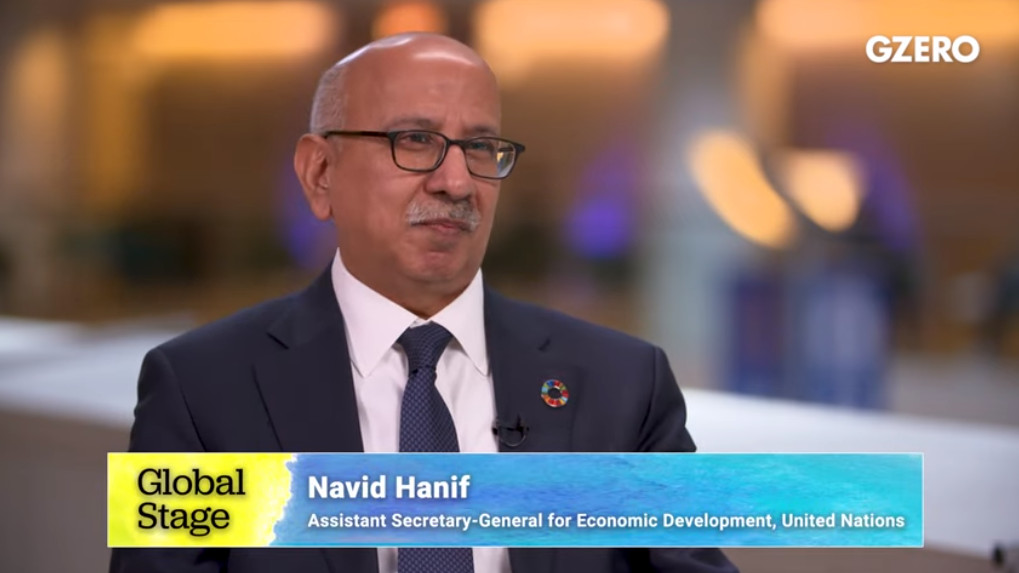
Date: 2025-01-15 Page is: DBtxt003.php txt00025470
UNITED NATIONS
LACK OF DEVELOPMENT PROGRESS
GZERO Media ... Tony Maciulis interviews Navid Hanif from the United Nations ... Staving off default: How unsustainable debt threatens human progress
LACK OF DEVELOPMENT PROGRESS
GZERO Media ... Tony Maciulis interviews Navid Hanif from the United Nations ... Staving off default: How unsustainable debt threatens human progress
Original article: https://www.youtube.com/watch?v=eTdLzlZa_z4
Peter Burgess COMMENTARY
This interview had my blood boiling. The conversation was very gentlemanly and polite and that is fine when the conversation is merely 'small talk'. But the issues being discussed were (are) enormous and deserve a whole lot of intense passion!
Bottom line ... the world is in a mess, and the top people and institutions are proving completely ineffective in getting to grips with the problems.
There are a lot of very 'good' people who are committing their professional lives to doing good work, but the 'system' is getting in the way rather than being a positive force multiplier.
This is not a new problem
Back in the early 1980s, my office in New York assisted a French accounting firm that was being used by the French Government to handle 'management oversight' of the United Nations. Our work involved assessing the performance and effectiveness of management systems at the UN Headquarters in New York. Bluntly put ... the UN did not have any 'management systems'!
When I was involved with this assignment, I had had about two decades of management modernization and improvement in the private corporate sector and was familiar with the management progress that had been made in the private sector up to that time. The UN was already 50 years behind the times.
When I did assignemts with the World Bank and IFC, the situation was a bit better, but not by much. In the early 1980s the top management specialist advising on government and development accounting was an economist with no accounting qualifications at all ... in fact the senior staff of both the World Bank Group and the IMF were dominated by economists with very little 'real world' experience of any sort. When I first did work for the World Bank, Robert McNamara was still the President of the Bank, and in many ways, in my view, had the right vision. Unfortunately, he had spent most of his career near the 'top' of organizations. This included being the CFO of Ford and then the President of Ford, being Secretary of Defense during the Vietnam War and then being appointed the President of the World Bank Group. My experience suggests that while he was at Ford there would have been a system of management information that was reasonably timely and reliable, but in hig Government role as Secretary of Defense in a very politically charged war situation the information flow would have been massively distorted. McNamara used 'management information' flows at Ford, in Government and at the World Bank, even though both in Government and the World Bank, the information was gamed and severely compromised.
Starting in the 1970s, I worked with the World Bank as an independant professional consultant. During my first assignment one of the World Bank staff instructed me to conclude my work in a very specific manner so that the results would be acceptable to McNamara. This was before we had done any 'field work' and my response was that the result of my work would be based on the reality of what was true, and not some fiction to suit decision makers. I never did any work for this particular staff member ever again. She had a quite successful career within the bank ... but the Bank had a less than stellar record with its projects!
In my view McNamara weakened the World Bank significantly by the decision to develop a cadre of 'Young Professionals'. These were academically trained young economists mainly from elite universities who joined the Bank with zero real world experience. Up to that point a big proportion of the Bank's professional staff were older and deeply experienced before joining the Bank ... many available as countries around the world became independent and the old 'Colonial Offices' shut down and made their staff redundent!
This intereview is so polite ... but the subject being discussed needs passion ... and passion was not part of this!
!!!!!!!!!
Peter Burgess
GZERO Media ... Tony Maciulis
Apr 14, 2023
79.6K subscribers ... 593 views ... 11 likes
#Debt #GlobalStage #DebtCrisis
Three-fifths of poor countries are drowning in debt. What does that mean?
Subscribe to GZERO on YouTube: http://bit.ly/2TxCVnY
Three-fifths of the world's lowest-income countries are debt distressed and in danger of default. Navid Hanif, assistant secretary-general for economic development at the United Nations, tells GZERO's Tony Maciulis that we need to make debt more sustainable by restructuring it. Hanif believes multilateral development banks, such as the World Bank, should offer affordable longer-term loans with lower interest rates to allow least-developed countries better opportunities to deal with crises like climate change, poverty, and educating children.
During a conversation at the World Bank/IMF spring meetings in Washington, DC, Hanif explains how a financial divide will eventually become a development divide, which is not good for the world. He explains the urgency of the growing debt problem.
However, Hanif also expresses optimism about the potential for progress coming after years of the pandemic, citing the growth in people gaining access to the internet and a renewed commitment to climate goals.
- Sign up for GZERO Daily (free newsletter on global politics): http://bit.ly/gzerosignal
- Subscribe to the GZERO World podcast (wherever you get your podcasts): https://podcasts.apple.com/us/podcast...
- Like GZERO on Facebook: https://www.facebook.com/gzeromedia/
- Follow GZERO on Twitter: https://twitter.com/gzeromedia
- Follow GZERO on LinkedIn: https://www.linkedin.com/company/1838...
#GlobalStage #DebtCrisis #Debt
Transcript
